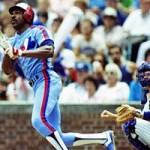Visits: 0
The induction this Sunday of Andre Dawson led to my annual evaluation of whether the chosen player(s) are worthy of such a lifetime achievement honor. With Dawson the answer is yes and no. What, you say? Let me explain.
By strict statistical standards, Dawson should not have been inducted. In nearly every important analytic metric except how many times he appeared in the top ten in a number of categories, he does not measure up with the game’s greatest players. A Hall of Fame player’s lifetime statistics must hold weight and I’m not referring to the usual stats HR/RBI/AVG/OPS.
There are many models used nowadays that can drill down to how valuable a player was to his team during his career. These stats are then weighted to even out the effect of differentiation like ballpark effects. The Baseball Encyclopedia uses the metric BFW, which means Batting and Fielding Wins. It is defined as the sum of a player’s batting wins, basestealing wins and fielding wins which when added indicates the number of games the player won for his team during his career. A Zero is considered average. Dawson’s BFW was 18.3, which means he won a little over 18 games during his career, a number which pales against other Hall of Famers.
Baseball Reference uses many of Bill James’ innovative stats to compare players. The list of performance metrics is too long to list here (see www.baseballreference.com. I have a direct link to it on my blog –“Going Yard”. ) The player is measured against the number of times he led the league in HR, RBI, AVG, Runs Scored, Hits, and Slugging Percentage
doubles, walks, stolen bases, number of games played, at bats and triples all scored on a sliding scale.
Let’s see how Dawson scores against THESE metrics: he ranks 214th with a score of 11. The average for a Hall of Famer is 27. The next metric uses the same group of stats to score the number of top ten appearances in each category. Here Dawson compares well to the current HOF players ranking 68th with 164 points the average being 144. The Hall of Fame Monitor is used to assess how likely the player is to make the Hall of Fame. It does not a measurement of how deserving the player is. Here, again, Dawson ranks well scoring 118 against the average of 100. Finally the Hall of Fame Career Standards again uses a group of stats that are weighted and scored to measure the overall quality of a player’s career. With 50 being average, Dawson comes in at 44.
The overall verdict? A great career, but not worthy of the Hall of Fame. I think the player should be above average in ALL of the critical measurements used.
Now let me explain why I think he does deserve to be in the Hall. Today, the process for choosing a player is quite diluted from the past. Players are not being held to the same standards before 1961, used because the league expanded, increased the number of games played and went coast to coast. That season was a weird anomaly, since the National League maintained the 154 game schedule while the American League went to 162. The next year, 1962, saw both leagues play 162 games.
But I digress, back to my point. Players in this era are given more leeway in terms of overall career quality. The Baseball Writers of America voters seem to skim over important statistics in favor of player popularity. Dawson made the All-Star Team eight times. Since 2000 and using the above benchmarks, Carlton Fisk, Dave Winfield, Eddie Murray, Paul Molitor, Wade Boggs, Ryne Sandberg, Cal Ripken, Tony Gwynn and Rickey Henderson were all deserving inductees. But the writers also voted in Tony Perez, Kirby Puckett, Gary Carter, Bruce Sutter, Goose Gossage, Dennis Eckersley and Jim Rice. This is Andre Dawson’s peer group. All were great players but none met all of the standards.
That’s why, by today’s standards, he belongs. Others in this group who have yet to be included are Steve Garvey, Don Mattingly, Jack Morris and Dave Parker. In upcoming years, Barry Larkin (whose rank is almost identical to Dawson’s, so watch if and when he gets in), Bernie Williams, Juan Gonzalez, and Curt Schilling should get in.
By the stricter standards, these players should be no-brainers – Bert Blyleven, Roberto Alomar, Edgar Martinez, Jeff Bagwell, Larry Walker, Craig Biggio, and Mike Piazza.
I’ve left Barry Bonds, Roger Clemens, Rafael Palmiero, Sammy Sosa and Mark McGwire off the list for obvious reasons.
It is beyond any further discussion on why Blyleven is not yet in. The excuses I’ve heard are bogus. If among the many teams he pitched for included New York and Boston he would be in by now. So let’s correct this ridiculous oversight and finally get him in next year.




3 Comments
You must be logged in to post a comment Login